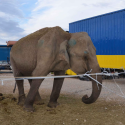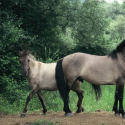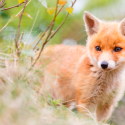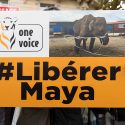Wikie, the little ball of anger
Wikie, the little ball of anger
07.05.2018
Antibes
Wikie, the little ball of anger
Exploitation for shows
Wikie began life separated from her mother, was inseminated by force and gave birth at the age of 8, while Orcas in the wild give birth at around the age of 15. Thereafter, she bore an infant from incest, and then turned into a raging ball of anger attacking humans. The deaths of her relatives seem to have extinguished her. Weary of war, she repeats henceforth as a Dictaphone the words that scientists have had fun teaching her.
Wikie was born at Marineland Antibes on June 1st, 2001. She was the first Orca to be born in the new Orca pool, Sharkane and Kim 2, barely two years after Inouk. She spent the first eighteen months of her life in a side pool next to her mother, a rather confined start in life.
At 8, the gentle little Wikie became increasingly angry. She assaulted her trainer and dragged her underwater during an incident that could have been fatal.
She rebelled again and again but at the end of these « waterworks », these executed movements in the water by the killer whale and her trainer, she did not allow herself to direct her anger towards humans.
That year, in 2009, Wikie had just been inseminated.
Her trainers had her lying on her back and holding her still. They then plunged a large rubber tube into her vagina through the cervix. A miniature camera was attached to it. Then, the thawed sperm was injected directly into the uterus. They even entered the uterine horn with the camera to ensure that ovulation was in progress. The process is painful and rarely successful. It must be repeated. It was new, and Wikie was the first killer whale in Europe to become pregnant in this way and to be able to keep the child.
$(document).ready(function(){ $(‘.diaporama’).bxSlider(); });
« It takes months to train an Orca to calmly accept artificial insemination, » Jon Kershaw told the press cheerfully, « A dose of 2 million sperm is usually injected into the female’s vagina to make her pregnant. In the case of Wikie no less than 4 doses had to be injected into her ovaries.
Not easy, indeed, to remain calm during these humiliating sessions, and even less to see an infant come out of her body of which she has never known the father! Especially since Wikie was very young at the time, barely 8 years old, whereas the Orcas in the wild rarely breed before 14 or 15 years old, with one child every 3 to 5 years. Wikie, she gave birth to Keijo less than two years later, with her half-brother or brother, we do not know exactly. In any case, with one of them. And among Orcas in the wild, this is something that is not done: incest is prohibited. But promiscuity and lack of partners push captive Orcas to the most abnormal behaviours.
So yes, she is angry Wikie, even if she no longer attacks her trainers and carers.
The endless agony of Freya, her adoptive mother, the flood of 2015 engulfing the great pool with muddy water with its oily reflection, and finally the brutal death Valentin at 19, still unexplained, all this seems to have been snuffed out.
So, it is without doubt to distract her that a « researcher” came to teach her to repeat English words, as John Lilly had done with Peter the dolphin back in 1965. Much was made of this experience in the press, which was not exceptional, given the highly sophisticated social cultures, dialects, and hunting techniques of free Orcas.
But about this, we do not speak. The Orca remains in the collective imagination a somewhat stupid animal, repeating the sounds without understanding them as a Dictaphone. The intelligence of cetaceans is the first secret of a dolphinaria. And their suffering, the second.









